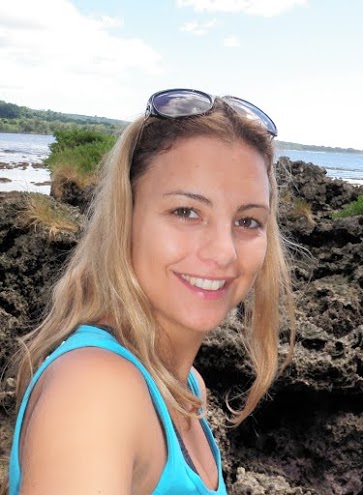|
What is your absolute most favorite thing about sea turtles? Sea turtles are warriors and champions of the sea. The probability of a sea turtle reaching sexual maturity is one in a thousand. They experience so many threats in each of their life stages, both terrestrial and oceanic, and still (some) make it! The fact that they have been around for millions of years also ascertains this. How has your love for these turtles altered the course you have been on throughout your educational career? When I decided to be a marine biologist, my dream was to work with manta rays; however after a small internship with a sea-turtle project in Brazil (Projeto TAMAR), I quickly changed my mind. After the internship I undertook my honors research studying the foraging ecology of green turtles. My first job and following jobs reflected my experience working with turtles. Now in an academic position, I try to expand and use my transferable skills to work with other species. What’s the most memorable excursion you’ve been on, and why? The remote islands of Torres Strait, which is where I conducted my fieldwork during my PhD, is the most memorable field location for me. In particular, Bramble Cay is the most northern land in Australian waters bordering Papua New Guinea waters. I used to camp at this cay for weeks while conducting my PhD to monitor green-turtle nesting and to explore potential impacts of climate change on sea turtles. The cay is extremely remote and only inhabited by endemic rodents and seabirds. It is impossible not to feel connected to nature at this paradisiac cay. Are there any challenges you’ve come across while you’ve been pursuing your dreams? How have you overcome them? Academia is a challenging place; you are always being judged and assessed. I have learned to make all the “judgments” a positive aspect of academia. Nowadays it drives me and provides a great opportunity for learning. Have you had any special mentors who have guided you in your pursuit? There have been many people who have inspired me throughout my pursuit, from curious kids at remote islands, to devoted resource managers, dedicated volunteers and exceptionally smart academics. Some have no idea that they have guided me in one way or another and have provided guidance in non-traditional ways. In academia, I am extremely fortunate to have Distinguished Professor Helene Marsh as a mentor; I have worked with her for the past five years, and her dedication and vision are truly inspirational. What is the most recent project you are working on? I am usually working on multiple projects simultaneously. Literally, right now (as I answer this interview) I am heading to Madison, Wisconsin (not the expected place for a marine biologist!), to work with the SILVIS lab on two projects: one to assess the exposure of sea-turtle nesting grounds to coastal development and the implications for management, and the other to forecast potential “Range Expansion of Marine Turtles” under different climate scenarios. What do you typically do while in the field? It really depends on what project I am working on, but it could be anything from monitoring nesting turtles, deploying temperature data-loggers, interviewing managers to conducting beach-elevation models. What is your least favorite thing to do for work? Paperwork!!! At the end of the day, what’s the most rewarding thing about what you do? Having the opportunity to teach and inspire others! What advice would you give other girls who are pursuing (or thinking of pursuing) an education and/or career in marine biology? Try to learn the multifaceted reality of being a marine biologist; there are many different directions that you can follow and areas that you can work. If possible try to volunteer and learn about as many as possible, so that you have a better understanding of the various possibilities. ------ Mariana’s adventurous spirit and enthusiasm for the world around her inspired a fulfilling vocation, which developed into a deeper connection with the earth we live on and its numerous remarkable forms of life. Her dedication to aquatic environments and their health and preservation is a testimony of the powerful effects hard work and determination can have on a scientista’s future; effects that can hatch from one simple act of curiosity, spurred by something as simple as the kiss of a manta ray.
By Heather Burkhart Talk about a life-changing kiss. When Mariana Fuentes was a teenager she visited a manta ray feeding area in the Cayman Islands where, she says, “a ray gave me the hugest hickey ever,” according to an interview posted in her National Geographic biography. This friendly moment wriggled its way into her heart, and as she asked questions on the manta ray’s behavior to the marine biologists accompanying her, it instantaneously defined her future. Mariana, now a marine biologist herself, currently works with sea turtles, having been enchanted by them while participating in an internship with Projeto Tamar during her undergraduate studies. She has since worked on projects in some of the most intriguing places around the world, including Barbados, Madagascar and Vanuatu. Not only is her work aiding sea turtles around the world, but her love of and enthusiasm for these gentle marine creatures is effortlessly contagious. 
About the Author
Heather is an undergraduate student at the University of Utah earning her BA in linguistics and cognitive science with an interest in studying aphasia and other language properties of the brain. She has written articles for the online magazine NVate, and is currently a section editor for The Scientista Foundation's Scientista Spotlight. When she is not studying or writing in a cozy corner of her home, she is most likely away having an adventure in the beautiful mountain backgrounds of Utah. Comments? Leave them below!
0 Comments
Leave a Reply. |
SPOTLIGHTSMeet our Scientista Spotlights -- current-day women in STEM and women from science history -- and find your role model! Read opinion editorials and history pieces to get additional inspiration.
WHAT'S NEWYOU MIGHT ALSO LIKE
WHAT'S HOTCONNECT WITH USARCHIVES
June 2018
|
The Scientista Foundation, Inc. All Rights Reserved © 2011-2021 | Based in NY | [email protected]
The Network for Pre-Professional Women in Science and Engineering
The Scientista Foundation is a registered 501(c)(3) -- Donate!
The Network for Pre-Professional Women in Science and Engineering
The Scientista Foundation is a registered 501(c)(3) -- Donate!










 RSS Feed
RSS Feed